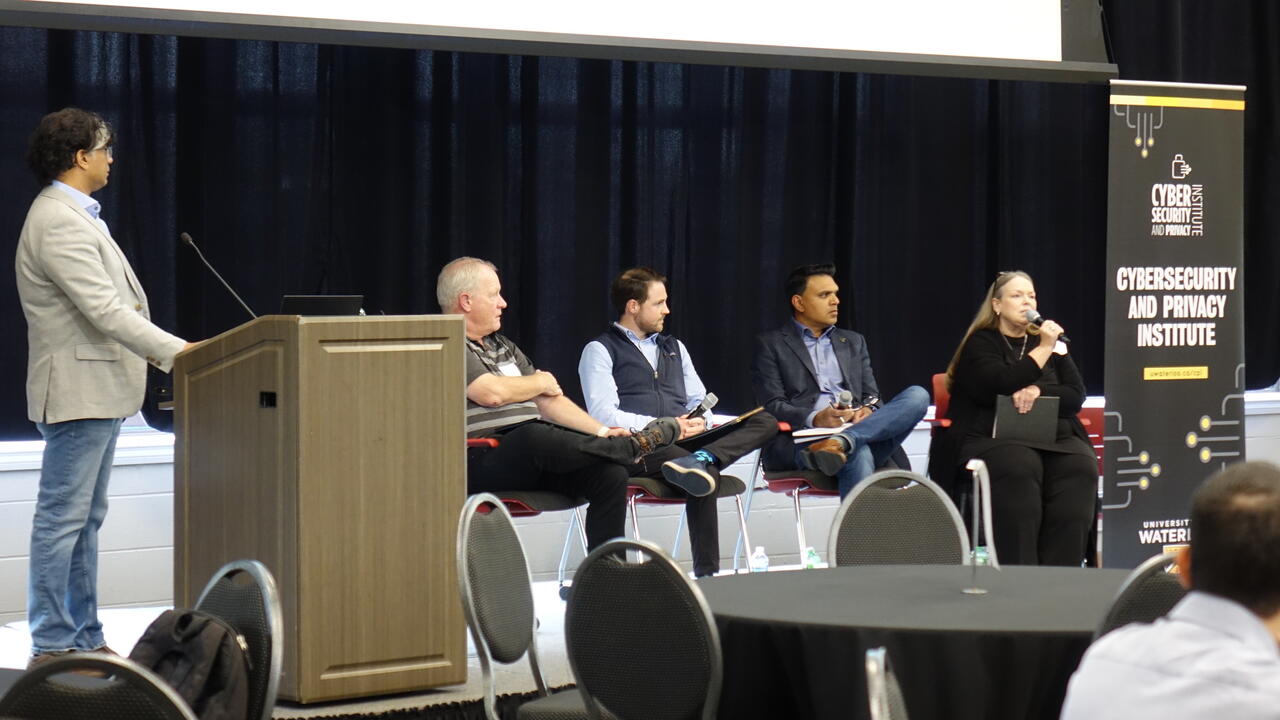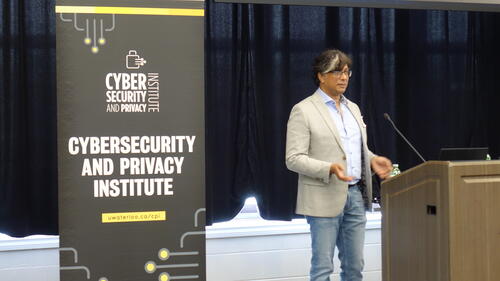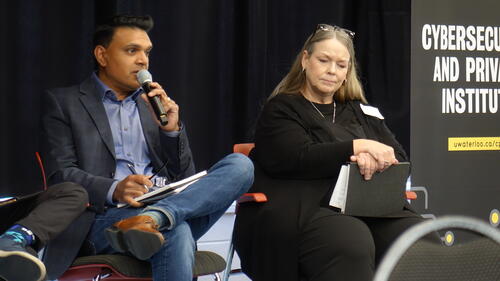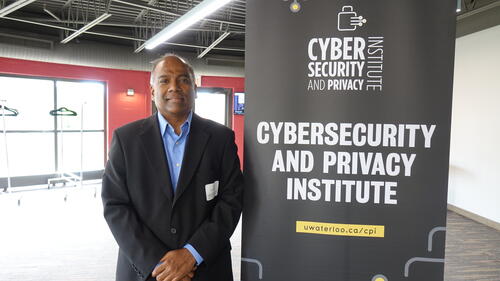
Waterloo ready to address cybersecurity talent gap, experts say
Cybersecurity and privacy conference underscores need for government, industry support to combat rising threats

Cybersecurity and privacy conference underscores need for government, industry support to combat rising threats
By Jon Parsons University RelationsAccording to a panel of academic and industry experts, Canada faces a crisis in training and retaining enough cybersecurity and privacy professionals to face increasing threats to the country’s digital infrastructure and data.
But with renewed government support and closer ties with industry partners, academic institutions like the University of Waterloo are on track to address the cybersecurity talent gap.
That’s the consensus at the 2022 Cybersecurity and Privacy Institute Annual Conference, hosted this week at Waterloo.
The conference was organized by the Waterloo-affiliated Cybersecurity and Privacy Institute (CPI). The interdisciplinary organization aims to tackle cybersecurity challenges through expertise in computer science, engineering, mathematics, cryptography and quantum computing.

Dr. Anindya Sen, associate director of CPI and a professor at Waterloo’s Department of Economics, facilitated the panel on the talent gap in cybersecurity.
Dr. Anindya Sen, associate director of CPI and a professor at Waterloo’s Department of Economics, facilitated a special conference panel on the talent gap, which now lacks some 25,000 workers in Canada alone.
“We are starting to see serious impacts on business,” said Deborah Clark-Forster, senior account executive with the Ontario Ministry of Economic Development, Job Creation and Trade. “The average ransom paid in Canada is $459,000, and some 64 per cent of all businesses were hit with cyberattacks in the last year alone.”
While all the panellists agreed that finding a sufficient number of cybersecurity professionals is among the most pressing challenges facing Canada, the key takeaway for conference participants is how to do that.
“We have to re-think academic programs and find academic relevance within the universities,” said Dr. Ken Barker, director of the Institute for Security, Privacy and Information Assurance and a professor of computer science at the University of Calgary. “We have to make a new computer security degree that fits with what is needed in the workplace.”
Barker suggested that some ways this could be accomplished are to bring the private sector directly into the classrooms to “actually help out with the training.” Barker also suggests universities need to expand the view of who is considered an ideal student for such programs.

L-r: Sanjeev Gill, Waterloo’s associate vice-president of innovation and executive director of WatSPEED; and Deborah Clark-Forster, senior account executive with the Ontario Ministry of Economic Development, Job Creation and Trade.
Those comments resonate with Sanjeev Gill, Waterloo’s associate vice-president of innovation and executive director of WatSPEED. WatSPEED is the University of Waterloo’s reimagined continuing education clearinghouse, offering micro-credentials and certificate programs with a special focus on technology upskilling.
“Technology is moving faster than people’s ability to keep up in the workplace,” said Gill. “The shelf life of knowledge is no longer ten or fifteen years, like it may have been when I graduated from university. Now, and especially in technical fields, the shelf life could be just a couple of years. That trend is most prevalent in cybersecurity.”
The development of WatSPEED, as Gill explains, seeks to address that need for ongoing upskilling and reskilling, but it is not something that can be done by Waterloo alone.
“It’s got to be academia with industry and with government,” Gill said. “It has to be done together.”
As for the opportunities available in the private sector, the panellists recognize that part of the issue is articulating the appeal of working in cybersecurity, which unfortunately does not have the prestige of some other computing fields. Cybersecurity, as one panellist said, is sometimes thought of as “working on the plumbing.”
But Ryan Westman, a senior manager for threat intelligence with eSentire, an industry leader in cybersecurity detection and response, says that cybersecurity should be seen as a great career opportunity and is very well-paying.
“What we’re looking for is people who have a desire to learn,” Westman said. “It’s great if they have some technical skills, but having the interest and desire is just as important.”
Making cybersecurity the kind of career that is attractive to the next generation of students is a challenge, Westman said, but that could be addressed with better promotion of the lucrative salaries and pathways for career growth.

Dr. N. Asokan, CPI’s executive director and a professor and Cheriton Chair in the Cheriton School of Computer Science.
Conversations like the one about the talent gap are part of the reason CPI exists, said Dr. N. Asokan, the institute’s executive director and a professor and Cheriton Chair in the Cheriton School of Computer Science.
“It is a research institute, and our members are doing cutting-edge and innovative research,” Asokan said. “But we are also looking to move the industry forward and addressing the talent gap is a huge issue.”
CPI’s annual conference runs October 6 and 7 at Federation Hall at the University of Waterloo. Visit the conference website for more details.

Read more
New technology makes the process of turning CO2 into valuable chemicals economically viable for industrialization

Read more
Box office earnings create upward pressure on stock prices for at least five days

Read more
Being able to let go of goals is a critical part of staying mentally healthy
The University of Waterloo acknowledges that much of our work takes place on the traditional territory of the Neutral, Anishinaabeg, and Haudenosaunee peoples. Our main campus is situated on the Haldimand Tract, the land granted to the Six Nations that includes six miles on each side of the Grand River. Our active work toward reconciliation takes place across our campuses through research, learning, teaching, and community building, and is co-ordinated within the Office of Indigenous Relations.